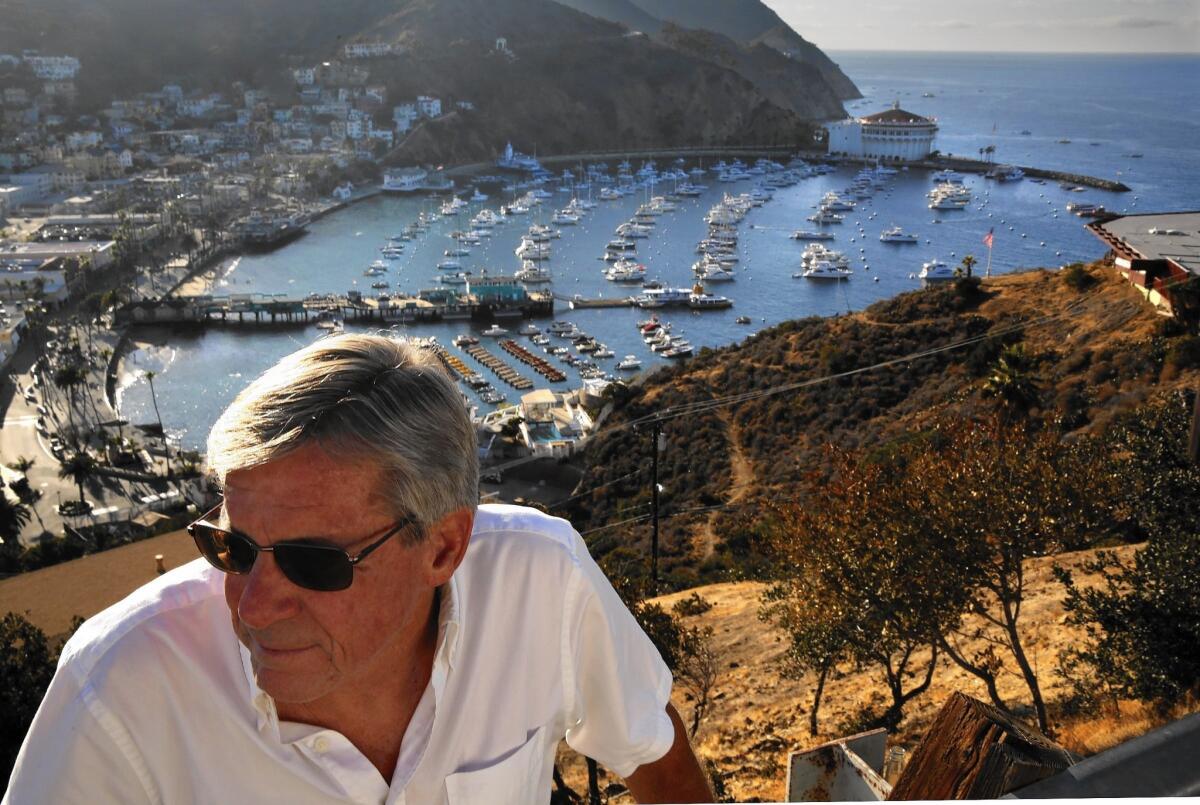On freight-dependent Catalina, an uproar over a new exclusive contract

- Share via
At about 9:15 each weeknight, the “Islander” barge rumbles toward the rocky shoreline of eastern Catalina Island — and on it, the daily essentials for 4,000 residents and an estimated 1 million visitors every year.
On a recent Tuesday evening, goods coming ashore ranged from the routine — pallets of milk jugs, kegs of beer — to the obscure: 50-foot steel beams needed to build a new Verizon cellphone tower.
“It’s our lifeline to civilization,” said Mayor Ann Marshall of Avalon, the island’s only incorporated city. “It’s survival.”
But over the last year, a battle has been brewing over who will control Catalina’s crucial commercial pipeline. The island’s largest landowner and employer, the Santa Catalina Island Co., chose to hand over freight delivery, beginning next year, to the owners of Catalina Express, which already handles the vast majority of the island’s passenger service.
The planned concentration of control in the island’s transportation system — for both people and goods — has left many in Catalina wary of rising freight costs on an island where the delivery of goods from the mainland is built into the price of everything. Gas already can cost more than $7 a gallon, and a jug of milk can run you $6.
Restaurateurs and hotel managers are keenly aware of how higher prices can leave a bad taste in visitors’ mouths.
The deal has also rekindled long-held concerns about the power wielded by the Santa Catalina Island Co., which was purchased by chewing gum magnate William Wrigley Jr. in 1919.
The Island Co., as it’s known to locals, owns essentially all of the island’s developable land, owns and leases many restaurants and hotels, and owns the dock space where the bulk of the island’s goods come ashore. As owner of the barge landing, the private company had the ability to choose who would control a vital public utility.
Though the dock sits on private land, it’s a public necessity for those living in the city of Avalon, falling under the jurisdiction of the California Public Utilities Commission. The commission regulates rates and grants licenses to carriers — or revokes them.
The losing bidders are asking state regulators to grant licenses to all three operators, opening up the island’s freight service to competition. They contend the winning company, called Avalon Freight Services, will hike rates because it is just entering the freight business and will have to invest in new equipment. In monopoly situations, the PUC approves rates by factoring in a company’s costs.
Competition would force all carriers to keep prices in line, they argue.
The Island Co. put out a request for proposals in 2012 for a new freight operator, reviewed proposals from eight operators and chose a newly formed venture run in part by the owner of the island’s primary passenger line.
That decision came to light only last year after the company named the new operator in a press release printed in the local newspaper, prompting locals to question how such an important decision could be reached without a public hearing.
“It just kind of had the feeling of a foregone conclusion,” said Pam Albers, a former Avalon city attorney who owns the Cafe Metropole. “If you’re just somebody who lives here, you’re scratching your head.”
Two of the losing bidders, Curtin Maritime and the incumbent, Catalina Freight Lines, have argued to state authorities that the Island Co.’s bidding process was “a sham with a predetermined outcome.”
Though many details of the agreement between the Island Co. and the new freight operator are confidential, public testimony and correspondence submitted to state regulators shows the Island Co. was able to negotiate additional business benefits from the lease. That includes a cut of the gross revenue from the freight service contract. The company’s percentage of the revenue is unknown — that figure was redacted in a copy of the lease that was submitted to the Public Utilities Commission.
Rich Coffey, chief executive of Catalina Freight Lines, the current provider, said revenue from the business could be up to $10 million a year.
The Island Co. benefits in other ways. The agreement gives it up to half of the warehouse space on the dock for its own goods and the ability to run its own cargo ships to and from the Catalina dock — perks the company does not have now, according to Coffey, the current freight executive. The agreement also gives the Island Co. the option to sublease additional storage space on the mainland, at the terminal the Catalina Express leases in San Pedro, according to testimony before the PUC.
Read the latest Essential California newsletter >>
The agreement gives the company an advantage over all other businesses shipping freight to the island, the losing bidders argue. It is especially valuable to the Island Co., a heavy user of freight services that is now launching development projects on the island, requiring shipping and storage of construction materials.
Both rival bidders have accused the Catalina Island Co. of rigging the process to favor the Catalina Express owners. The Bombard family, which owns the Express, has long had close business ties to the company, historically operating an island resort area known as Two Harbors.
The matter now lies with the utilities commission. A judge at the commission has held a series of hearings on the freight contract in recent months.
Representatives from the Santa Catalina Island Co. declined to comment on the specifics of the new freight agreement. But they said they conducted a fair selection process and chose the most capable bidder.
“It was a completely open and, from our view, fair process,” said Kris Wilhelm, a senior vice president of the Island Co.
Randall Herrel, chief executive of the company, said they brought in some elected officials and business owners to discuss the selection process. But ultimately, he said, it was “a private party lease.”
“We typically don’t go out to the public and ask their input when we’re renewing or extending or coming up to a new tenant,” he said.
Greg Bombard, president of Catalina Express and the newly formed Avalon Freight Services, said his company is committed to doing “the best job we can for the community.” He said he questioned the “sour grapes” of his competitors, who he said knew from the beginning that only one freight company would be chosen.
“You can’t have three operators, with the infrastructure and the overhead that it takes to do this operation, and do it right,” he said.
Bombard said the clause involving a percentage of revenue is a common feature in commercial leases.
In documents submitted to the PUC, his company joked that the losing bidders were trying to make the deal “something akin to the plot of the 1974 film ‘Chinatown.’”
It’s hard to overstate the importance of freight operations to every resident and business on Catalina. Every week, more than a thousand pounds of hotel linens travel back and forth for laundering on the mainland, because of drought restrictions. When the Catalina Caballeros equestrian group roams the island’s interior every fall, dozens of nervous horses arrive via the barge.
Even the dead must make the 26-mile journey across the channel for funeral preparation.
Tensions are especially high as the drought-stricken island faces the prospect of more severe water restrictions — mandating 50% reduction — later this year. Catalina’s restaurants only serve bottled water to cut back on dishwashing; swimming pools and spas must be filled with mainland water.
The controversy has brought an unusual level of scrutiny to an island known as a getaway for Hollywood stars like Clark Gable and Joan Crawford. Calling Catalina “close-knit” is an understatement. There were 55 people in the most recent high school graduating class. Remembering phone numbers is just a matter of four digits: Everyone has the prefix “310-510-”.
Even Marshall, the jovial mayor who was just elected last year, insists she cannot be called an “islander.” She’s lived here for only three decades.
Marshall is careful with her words on the freight issue. In June, she wrote a letter to the state saying the city was “in favor of free competition” and would support multiple operators.
She said she wants to provide a voice to “the people who don’t feel that they can speak up.” But she declined to comment on whether the Catalina Island Co. used a fair process in choosing the provider.
Many business owners in Avalon also declined to go on the record, saying they feared speaking up against the company.
Steve Bray, who runs Steve’s Steakhouse along the Avalon waterfront, said at recent public hearings that he was in favor of having multiple freight providers compete for business.
“No restaurateur over in California has to deal with an extra couple hundred thousand dollars out of their pocket just to pay for this freight,” he said. “I think everybody should have a chance at this.”
But he recently declined to comment further, saying he had to “plead the fifth” because it was “too small of a town.”
Supporters of the Santa Catalina Island Co.’s decision say that there isn’t enough freight to support multiple shipping companies, and that the quality of service could decline if the dock became too crowded.
“People are just saying ‘free enterprise’ without thinking about it,” said Charlie Canby, a machinist who owns a refrigeration and marine parts business. “Some people think these barges can just come and go at a whim.”
Curtin Maritime Chief Executive Martin Curtin said he became suspicious when he received an email from an Island Co. consultant four months before the company formally asked for proposals to run freight.
The email, from Van Holland of consulting firm Hardesty, said the Island Co. was in negotiations with the Port of Los Angeles to set up a freight depot to Catalina — at the same berth where the Catalina Express passenger line operated.
In hearings with the PUC, Curtin’s lawyers have argued the email showed an upfront preference for Bombard.
“This is a city; this isn’t a monarchy,” Curtin said. “You can’t just do whatever you want and expect for there not to be blowback.”
Officials with the Santa Catalina Island Co. said that was just one of several options they were exploring. The final decision on Catalina’s freight service is expected from the Public Utilities Commission by October.
To some observers, the problem is clear.
“They’re making deals in their personal best interest,” said Mike Sheehan, a retired produce industry exporter and pilot who does aerial surveys of the island’s ecology. “This whole deal is just one big spin job.”
MORE FROM BUSINESS
Stakes are high for Apple going into ‘critical event’
Applebee’s is moving its headquarters to Glendale
August jobs report sends mixed signals to Fed on interest rate hike
More to Read
Inside the business of entertainment
The Wide Shot brings you news, analysis and insights on everything from streaming wars to production — and what it all means for the future.
You may occasionally receive promotional content from the Los Angeles Times.











